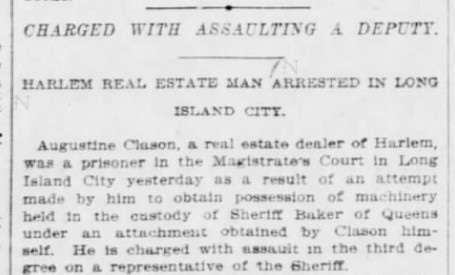Before Shawsheen Village Frye Village Stories
This part of the story takes us out of Andover and Frye Village as we trace the ownership and management of the degreasing plant.
As the Morse String Manufacturer business was coming to an end in 1895, John T. Morse was working on his next business venture.
It's 1896, enter Augustus Clason, a wealthy Virginia farmer and real estate dealer living in Harlem, NYC.
From the Fall River Daily Evening news, we learn that in the course of a real estate deal, Clason was introduced to Morse, who was described this way:
“Mr. Morse was a promoter, and was interested in a scheme for making druggists’ supplies out of wool grease...”
At first, “Morse and (business partner Louis) King were allowed to use a store in one of Clason’s buildings in New York. Clason became interested in Morse’s scheme, and wanted to give his brother William A. Clason a chance to work, so he entered with Morse into the formation of the Morse Oil & Pharmaceutical at Long Island City, in New York, and began the erection of a plant to manufacture Morse’s preparation.”
But then in 1897, Morse Oil & Pharmaceutical found itself without a supply of wool grease.
“Morse had patents and a process, for extracting wool grease out of wool, and he suggested the formation of another company, which should buy his patents and manufacture wool grease. Clason was agreeable, and Morse Wool Treating company was organized, under a New Jersey charter, with a capitalization of $250,000.”
Augustus Clason was also an investor in the Morse Wool Treating company in Norton, MA.
Apparently, bookkeeping at the company was not a strong suit. As funds were invested in the company,
“A fact worthy of note is that (Clason) took no notes for the money which is claimed to have been advanced b him, and until 1898 there was no fixed system of bookkeeping between plaintiff and defendant being claimed to have been made verbally.”
Financial troubles between brothers Augustus and William Clason and John T. Morse followed. The situation did not turn out well for Augustus Clason, the original investor.
In an annual meeting that started with Augustus Clason as president and Morse as treasurer, ended
“when the votes were counted, (Augustus) Clason found that his brother William A. Clason, was elected president, Morse was treasurer, and he was shut out. Clason was offered the position of treasurer, but he declined…” A lawsuit was filed, which Augustus Clason eventually won.
Things went from bad to worse for Augustus Clason. June 9, 1900, the New York Tribune reported:
“Augustus Clason, who is said to be a millionaire, was arraigned in the Police Court yesterday on the charge of assaulting Deputy Sheriff Edward J. Orpheus…It appears that the Deputy Sheriff was placed in charge of the property of the Morse Oil & Pharmaceutical company...Sheriff Baker having seized the property under writs of attachment. Mr. Clason...wanted to take possession (of the property). He appeared yesterday morning with trucks rigged with derricks and about twenty men. He announced that he had come to take the property.”
Other officers rushed to the scene. As Deputy Sheriff Orpheus blocked the entrance to the property, “Mr. Clason struck him with an umbrella, seized him by the throat, and tore his clothes.”
The 60-year-old Augustus Clason was arrested, charged, and released on parole.
And so ended Morse Oil & Pharmaceutical, and Morse's relationship with Clason.
Two years later, in 1902, the American Degreasing company was listed in the Wool and Cotton Reporter as a company for the first time. That same year, the American Degreasing company purchased of the Frye Village mill.
Robert Brailsford, who in 1900 was living as a boarder with John T. Morse, arranged the sale. F.A. Conklin of New York was reported in the September 9, 1902 Andover Townsman, as representing the firm.
A news article about Mr. Conklin revealed his connection to American Degreasing. In the February 14, 1903 Brooklyn Citizen newspaper, it was reported that
“Colonel F.A. Conklin, a wealthy property owner of this borough, who is president of the American Degreasing Company, of Andover, Mass., was in...Police Court today to...obtain advice as to how to proceed to have a man arrested, who it is alleged, dismantled his house at No. 679 Macon street, of all its furnishings.”
As intriguing as this tidbit is (and I haven’t had time to pursue the story yet), the article also noted that the alleged theft occurred while “Mr. Conklin made his customary trip to Andover.”
And so we learn that F.A. Conklin was president of the American Degreasing company.
The relationship between these on again-off again business partners was complicated. The story has been followed mostly through reports of lawsuits between the men. We get little sense of their personalities in census records and other reports. We see actions, but gain little understanding of motives behind the actions.
Our story next week takes us back to Frye Village and the business of wool degreasing. Stay tuned!






